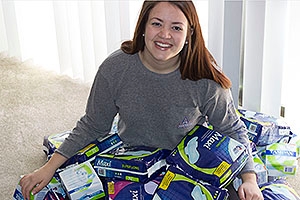In the Community
Human Rights and Hygiene

Exceeding Expectations
Initially, Miranda Lang had modest goals. For her women's health-related GoFundMe campaign, she hoped to raise about $250. Remarkably, within just 48 hours of starting her campaign, she brought in $1,000. By about two weeks, she had cleared more than $2,600.
"The success was amazing, and I just didn't expect it," says Lang, a junior at American University.
How did her fundraising totals so thoroughly surpass her original projections? As it turns out, she was gathering products that are sorely needed by millions of American women. And there's nothing quite like the power of a great idea.
Lang's GoFundMe campaign—which is still active—raises money for feminine hygiene products that will be provided to homeless women. She's also received direct donations of the actual hygiene products. She's been so inundated with generosity, in fact, that her apartment is now covered with trash bags full of tampons and maxi pads.
How it Started
Lang's idea germinated and came to fruition in just a few months. As a Freshman Service Experience leader during Welcome Week, her group was assigned to Thrive DC, a Columbia Heights nonprofit that provides services for homeless and vulnerable individuals.
In talking with a long-term volunteer there, Lang asked what kinds of feminine hygiene products are provided to clients. "She said that it's not something that they have a constant influx of, and it just depends on how donations go. And I just kind of kept that in mind," Lang recalls now.
This semester, Lang took a course called "Health in the Digital Age," taught by instructor Stef Woods. As part of an activism project for the class, she started researching feminine hygiene issues and came across an article on the popular feminist blog Jezebel. The story reported that a woman will use more than 11,000 tampons or pads in her lifetime, and it placed the annual cost of feminine health at $2,663.02. So Lang set up her GoFundMe campaign with these figures in mind. In quickly raising more than $2,600, she already had enough to hypothetically provide one woman with a year's supply of feminine health products.
At the conclusion of her GoFundMe campaign, Lang will donate the products to Thrive DC officials and they'll distribute those products where they're most needed.
We're All Just People
Lang has volunteered at Thrive DC one day a week throughout the semester. And she exalts the organization as well as the community it serves. "What I love about Thrive is that it created this space just for women to come in the afternoons," she says. "It's fun to just hang out, talk to people, help serve the meals, help clean up, and be a little bit hands on deck."
Activities include movies, yoga, nail painting, and games, she says. "Another thing about Thrive that I really like is that at the end of the day we're all just people. Circumstances do differ, experiences do differ, but we are all just people. So when you're watching a movie with Dwayne 'the Rock' Johnson, we're all just enjoying the movie."
Compassion and Humility
With her latest foray into community service, Lang is continuing a family tradition. Growing up in Bridgeport, a small West Virginia town south of Morgantown, she learned the value of activism from her parents. They were heavily involved in the Bridgeport Challenger League, a baseball organization for children with physical and mental disabilities. Lang frequently watched the games, and she wears her Bridgeport Challenger League apparel to this day.
Lang started out at Marymount University in Arlington before transferring to AU, where she's now an American studies major with a public anthropology minor. She's a member of the social sorority Phi Mu, and she previously worked on campus. But she got so fixated on her feminine hygiene project, she quit her job. "I realized that when I'm passionate about something, it is my only focus," she says.
Woods has been advising Lang throughout this entire GoFundMe process, and she's been amazed at Lang's commitment from the get-go. "She has such compassion and humility. She approached it so openly, and really wanted to learn and figure out what was needed. And [she] confirmed that her idea was something that would benefit the community," says Woods, who teaches in the American Studies Department. "I think why people responded to it is that it was truly tapping into an unmet need."
A Conversation Worth Having
Years before Lang was even born, there were Massengill commercials that generated a fair share of derision. There was the one on a boat, with a daughter telling her mother about her "not so fresh" feeling. There was another ad about douching (not a medically recommended practice these days) featuring a mother and daughter walking on the beach. YouTube clips of those ads still provoke online mockery.
But has public dialogue on women's hygiene really improved? This is not a trivial matter, because it's hard to address women's health issues if we can't even discuss them.
"It's weird talking about it, and I don't know why. It's something that I can't control. Women who are currently experiencing homelessness can't control it. So I don't know why there's such a stigma surrounding it. There shouldn't be," says Lang.
Even with social media and candid blogs like Jezebel, Woods says we still have a ways to go. "What we feel comfortable reading in the privacy of our own space is different from what we talk about," she says.
In the meantime, Lang will continue doing her part to assist women. She recently upped her GoFundMe campaign fundraising goal to $5,326. This spring she'll take Woods' "Activism and Social Media" class, and she's already consulted her professor about future endeavors in the D.C. area. Lang adds, "I think there are little avenues for creating a nice amount of change."
Do you know of a recent example of student innovation or creativity? If so, drop us a line at sangillo@american.edu.